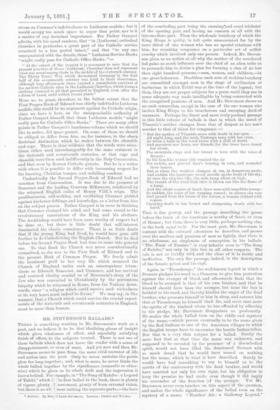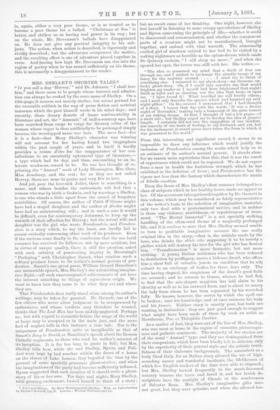MR. STEVENSON'S BALLADS.* THERE is something wanting in Mr. Stevenson's
work as a poet, and we believe it to be that idealising gleam of insight which gives wholeness of effect, and especially satisfying finish of effect, to the subjects treated. There is not one of these ballads which does not leave the reader with a sense of disappointment, or even of want. And yet now and then Mr. Stevenson seems to pass from the mere vivid narrator of life and action into the poet. Only he never sustains the poetic glow for long together ; and, what is more, he never binds the whole ballad together by the significance (romantic or other- wise) which he gives to its whole drift and the impression it leaves behind. For :xample, in " The Song of Rah6ro : a Legend of Tahiti," which first ballad in the book, there is plenty • of vigour, plenty I novement, plenty of keen external vision, but there is no wh ness uniting the separate parts ;—the hero 4' Ballads. By Roe :t Louis &ovens= London ; Matto and Wiudus. of the concluding part being the cunning:and cruel trickster of the opening part, and having no concern at all with the intermediate part. Then the wholesale butchery of which the King Hiopa is guilty, is left quite unaccounted for by the mere thirst of one woman who has no special relations with him, for wreaking vengeance on a particular act of selfish cruelty which involved only one person. Indeed, Mr. Steven- son gives us no notion at all why the mother of the murdered lad gains so much influence over the chief of an alien tribe as to persuade him to devise a plan for burning a elan of no less than eight hundred persons,—men, women, and children,—in one great holocaust. Doubtless such acts of reckless butchery are committed amongst men in the stage of civilisation or barbarism in which Tahiti was at the time of the legend ; but then, they are not proper subjects for a poem until they are in some adequate way made intelligible by being connected with the recognised passions of men. And Mr. Stevenson shows us no such connection, except in the case of the one woman who incites King Hiopa to his treacherous and sweeping deed of massacre. Perhaps the finest and most truly poetical passage in this little volume of ballads is that in which the mood of Taimatea's mother changes from that of despair at her son's murder to that of thirst for vengeance :— "But the mother of Titmat4a arose with death in her eyes. All night long, and the next, Tailtrapu rang with her cries. As when a babe in the wood turns with a chill of doubt And perceives nor home, nor friends, for the trees have closed
her about, The mountain rings and her breast is torn with the voice of despair So the lion-like woman idly wearied the air For awhile, and pierced 'men's hearing in vain, and wounded their hearts.
But as when the weather changes at sea, in dangerous parts, And sudden the hurricane wrack unrolls up the front of the sky, At once the ship lies idle, the sails hang silent on high, The breath of the wind that blew is blown out like the flame of
a lamp, And the silent armies of death draw near with inaudible tramp : So sudden, the voice of her weeping ceased ; in silence she rose And passed from the house of her sorrow, a woman clothed with repose, Carrying death in her breast and sharpening death with her hand,"
That is fine poetry, and the passage describing the pause before the burst of the hurricane is worthy of Scott, or even of Homer; but then, there is very little, perhaps nothing else, in the book equal to it. For the most part, Mr. Stevenson is content with the outward adventure he describes, and passes over the motives and passions of men so lightly, that there is no wholeness, no singleness of conception, in his ballads. "The Feast of Famine" is very inferior even to "The Song of Rah6ro," not only in this but in all other respects. The tale is not so lucidly told, and the Close of it is feeble and ineffective. The only fine passage, indeed, is the description of the fanatic priest and his vigil.
Again, in "Ticonderoga," the well-known legend in which a Stewart pledges his word to a Cameron to give him protection against the avenger of blood, and afterwards finds that the blood to be avenged is that of his own brother, and that he himself should have been the avenger, but none the less is faithful to his word, and thereby kindles the anger of the dead brother, who presents himself to him in sleep, and assures him that at Ticonderoga he himself shall die, and meet once more the spirits of the kindred whom he has offended by adhering to his pledge, Mr. Stevenson disappoints us profoundly. He makes the whole ballad turn on the riddle and mystery of the name,—which proves eventually to be the name given by the Red Indians to one of the American villages in which the English troops have to encounter the hostile Indian tribes. But that is a very thin subject for a ballad. Surely the mere fact that at that time the name was unknown, and supposed to be revealed by the presence of a disembodied spirit, would not have filled the denounced Stewart with so much dread that he would have mused on nothing but the name, which is what is here described. . Surely he would have had something to say to himself as to the merits of the controversy with his dead brother, and would have asserted not only his own right, but his obligation to keep the promise he had made, even though it did imply his surrender of the function of the aVenger. Yet Mr. Stevenson never even touches on this aspect of the question, and makes the whole significance of the ballad turn on the mystery of a name. "Heather Ale : a Galloway Legend," is, again, either a very poor theme, or is so treated as to become a poor theme for a ballad. "Christmas at Sea" is better, and strikes us as having real power in its way ; but on the whole, Mr. Stevenson's ballads have disappointed us. He does not give any poetical integrity to his sub- jects. The action, when action is described, is vigorously and vividly described ; but the adventure overpowers the motive, and the resulting effect is one of adventure pieced together in verse. And (seeing how high Mr. Stevenson can rise into the region of poetry when he has mused sufficiently on his theme, this is necessarily a disappointment to the reader.















































 Previous page
Previous page